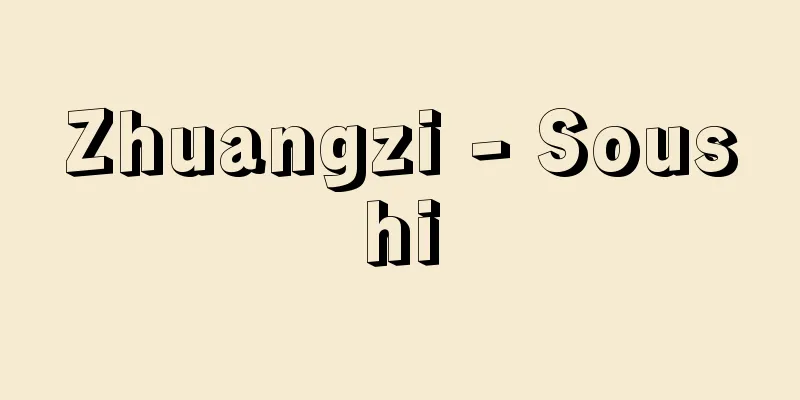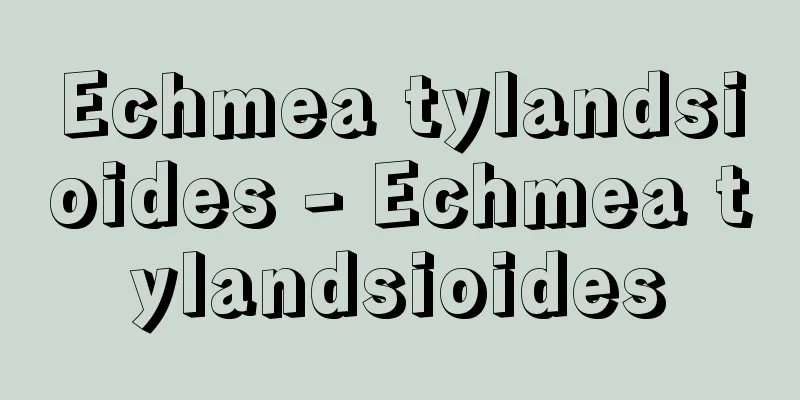Zhuangzi - Soushi

|
Date of birth and death unknown. An ancient Chinese thinker. A representative of the Taoist school among the Hundred Schools of Thought. Also refers to the book "Zhuangzi" which is said to be his work. [Osamu Kanaya December 14, 2015] personHis surname was Zhuang, and his given name was Zhou. He is said to have been active around 300 BC during the Warring States period, slightly later than Mencius. He was born in Meng (Shangqiu County, Henan Province) in the Song Dynasty. He was a minor official in the Lacquer Garden for a time, but generally lived a free life. He was on close terms with Hui Shi of the Logic School, but his other achievements are unclear. He is generally considered to have perfected Taoist thought by following the ideas of Laozi, and is sometimes referred to as the Laozi-Zhuang school of thought, but there are doubts about the order of events due to the vagueness of the dates and achievements of Laozi, as well as the differences between the two schools of thought. Unlike Laozi's realistic success-ism, Zhuangzi has a strong speculative tendency influenced by Yang Zhu's theory of self-centeredness and Tian Pian's theory of equality. [Osamu Kanaya December 14, 2015] bookZhuangzi is made up of 33 chapters, divided into 7 internal volumes, 15 external volumes, and 11 miscellaneous volumes. The internal volumes are relatively old and are close to those of Zhuang Zhou, while the external and miscellaneous volumes were developed in later times and show a mix with Laozi and exchange with other ideas. It is thought that the work was completed by the end of the Warring States period (the end of the 3rd century BCE), but the text continued to be divided and merged after that, and the 33 chapters we see today were established after the annotations by Guo Xiang of the Jin dynasty. The annotations by Guo Xiang are the oldest surviving complete basic material, and many annotations were created afterwards, including the Annotated Commentary by Cheng Xuanying (c. 601-c. 690) of the Tang dynasty and the Oral Meanings by Lin Xiyi (1193-?) of the Song dynasty. The Annotated Commentary was widely read in Japan during the Edo period. [Osamu Kanaya December 14, 2015] ThoughtZhuangzi's thought is based on the idea of equality of all things. It is a kind of conceptual philosophy that regards all differences in reality as equal, emphasizing a transcendental position that regards all opposing aspects as one, from life and death, nobility and lowliness, big and small, to right and wrong and evil, and seeks to transcend the troublesome suffering of reality that arises from being caught up in these opposing aspects. This high state was called "Daoshu" (the center of the Way) or "Tianjun" (the center of heaven). And he named this free state of life, freed from the constraints of the secular world, "Shoyoyu" (idyllic play without constraints). The method to reach this state is "injun". It is to "follow in accordance with cause" and entrust oneself to the natural, absolute truth that "takes place by itself". This requires an attitude of selflessness and forgetfulness. This is what is called "zabou" (sitting and forgetting). It is only when one casts aside the fickleness of being human and becomes one with the natural absolute truth, in the state of "resting in the heavens," that a free and unrestrained world of spirit opens up. There is a kind of transcendental religiosity here. In short, Zhuangzi's thought was to seek freedom and peace of mind through the philosophy of the equality of all things and the causalism that is based on this. [Osamu Kanaya December 14, 2015] Influence on future generationsHowever, in later studies of Zhuangzi, the transcendental religiosity of Zhuangzi opened up a connection with Taoist thought, leading to the strengthening of inner training, but on the other hand, there was also a growing interest in the secular world, which sought practical results, and people sought success in life and politics, drawing a strong connection with the Laozi. This can be seen in the outer and miscellaneous volumes of the Zhuangzi, but it is also characterized by the emphasis on paying attention to one's inner nature as a practice for reaching one's ideal, and on "reverting to one's nature" and "settling into the peace of one's nature and life" as they are. Later, in the Huainanzi, written during the time of Emperor Wu of Han, an attempt was made to integrate various ideas from a Laozi-Zhuangzi eclectic standpoint, and this tendency is particularly evident there. Zhuangzi was widely read and its ideas became popular during the Wei-Jin and Six Dynasties periods, and many of its so-called Qingdan contents were related to Zhuangzi, supporting the aristocrats' transcendental spirit. On the other hand, Taoism, which arose in the Later Han Dynasty, deified Laozi as the Great Master of the Ancient World, and eventually elevated Laozi to the position of founder. Along with this, Zhuangzi was also deified as a divine immortal. Tao Hongjing of the Liang Dynasty ranked him in the third rank as a true spirit, and Emperor Xuanzong of the Tang Dynasty honored him as a Nanhua Zhenren, and his book came to be called the Nanhua Zhen Jing. [Osamu Kanaya December 14, 2015] "Zhuangzi, translated and annotated by Osamu Kanaya (Iwanami Bunko)" ▽ "The Complete Works of Yoshio Takeuchi, Volume 6: Laozi and Zhuangzi (1978, Kadokawa Shoten)" ▽ "Zhuangzi, by Mitsuji Fukunaga (Chuko Shinsho)" [Reference items] | | |Source: Shogakukan Encyclopedia Nipponica About Encyclopedia Nipponica Information | Legend |
|
生没年不詳。中国古代の思想家。諸子百家のなかの道家(どうか)の代表者。またその著作とされる書物『荘子(そうじ)』のこと。 [金谷 治 2015年12月14日] 人物荘が姓、名は周(しゅう)。戦国時代の紀元前300年ごろから孟子(もうし)にやや遅れて活躍したらしい。宋(そう)国の蒙(もう)(河南省商邱(しょうきゅう)県)に生まれる。漆園(しつえん)の小役人となったときもあるが、おおむね自由な生涯を送った。論理学派の恵施(けいし)と親しい交遊があったが、その他の事績は明白でない。普通、老子(ろうし)の思想を受けて道家思想を大成したとされ、老荘思想という併称もあるが、老子の事績と年代のあいまいなことや両思想の違いなどの点から、その前後関係には疑問ももたれている。老子の現実的な成功主義と違って、荘子では楊朱(ようしゅ)の為我(いが)(自己中心)説や田駢(でんぺん)の貴斉(きせい)(万物平等)説を受けた思弁的傾向が強い。 [金谷 治 2015年12月14日] 書物『荘子(そうじ)』は33編で、内編7、外編15、雑編11に分かれているが、その内編が比較的古くて荘周のものに近く、外・雑編は後世の発展で老子との折衷や他思想との交流がみられる。ほぼ戦国末(前3世紀末)にはまとまっていたと思えるが、テキストの分合はその後も行われ、今日の33編が定まったのは晋(しん)の郭象(かくしょう)の注本以来である。郭象注は完本として現存する最古の基本資料で、その後、唐の成玄英(せいげんえい)(601ころ―690ころ)の『注疏(ちゅうそ)』、宋(そう)の林希逸(りんきいつ)(1193―?)の『口義(こうぎ)』のほか多くの注がつくられた。日本で江戸時代に広く読まれたのは『口義』であった。 [金谷 治 2015年12月14日] 思想荘子の思想はまず斉物(せいぶつ)思想をその根底に置いている。それは現実のすべての差別の相を平等視する一種の観念哲学であって、生死、貴賤(きせん)、大小から是非善悪の問題まで、それらの対立相を斉一視する超越的な立場を強調し、その対立の相にとらわれることから生まれる煩わしい現実の苦悩を超脱しようとしたものである。この高い境地を「道枢(どうすう)」(道の中心)とか「天鈞(てんきん)」(天の中心)とよんだ。そして俗界の束縛から解放されたその自由な境涯を「逍遙遊(しょうようゆう)」(とらわれのないのどかな遊び)と名づけた。その境地に達するための方法が「因循(いんじゅん)」である。それは、「自(おの)ずからに然(しか)る」自然な絶対の道理に「因(よ)り循(した)がい」身をまかせていくことである。そこには無私忘我の態度が要求される。「坐忘(ざぼう)」がそれであった。人としてのさかしらを捨てて自ずからなる絶対の理と合一するところ、「天鈞に休(いこ)う」境地にこそ、とらわれのない伸びやかな精神の自由世界が開かれる。そこには一種の超脱の宗教性があった。要するに、万物斉同の哲学とそこに基礎を置く因循主義とによって、精神の自由と平安を求めるのが、荘子の思想であった。 [金谷 治 2015年12月14日] 後世への影響ところが荘子の後学になると、その超脱の宗教性は神仙思想との結合を開き、内面的な修行の強化をもたらすが、他面ではその現実的な効果を求める世俗的関心も強まり、処世や政治での成功も追求されて、『老子』との接近も強くなっている。そのありさまは『荘子』の外・雑編にみられるが、理想に達するための実践として内的な本性への注視が加わり、「性に反(かえ)り」、あるがままの「性命の安らかさに落ち着く」ことが強調されるのも、その特色である。やがて漢の武帝(ぶてい)のときの『淮南子(えなんじ)』では、老荘折衷の立場で諸思想を統合しようとするが、そこでもこの傾向はとくに著しい。『荘子』がよく読まれて、その思想が時代の流行ともなったのは魏晋(ぎしん)から六朝(りくちょう)時代で、いわゆる清談の内容も多く荘子に関係し、貴族たちの超俗の精神を支えるものとなった。 一方、後漢(ごかん)からおこった道教は、老子を太上老君(たいじょうろうくん)として神格化し、やがて老子を開祖として祭り上げたが、それに伴って荘子もまた神仙化し神格化された。梁(りょう)の陶弘景(とうこうけい)によって真霊の位として第三級に並べられ、唐の玄宗(げんそう)によっては南華真人と尊称され、その書は『南華真経』とよばれることになった。 [金谷 治 2015年12月14日] 『金谷治訳注『荘子』(岩波文庫)』▽『『武内義雄全集6 老子と荘子』(1978・角川書店)』▽『福永光司著『荘子』(中公新書)』 [参照項目] | | |出典 小学館 日本大百科全書(ニッポニカ)日本大百科全書(ニッポニカ)について 情報 | 凡例 |
>>: Song poetry (English spelling)
Recommend
Water flag
…The cultivated Japanese iris is a Japanese impro...
Wilderspin, S. (English spelling) WilderspinS
...The purpose was to prevent the adverse effects...
Pelletier, PJ (English spelling) PelletierPJ
…One of the alkaloids contained in the bark of th...
《Phonology》 - Oninron
…These studies were compiled in “Studies on the P...
Obihajime - Obihajime
… [Hiasa Harueko] [Obi Folklore] Obi belts play a...
Kasumigaoka Athletics Stadium
…Famous modern large stadiums include Wembley Sta...
Alpinia kumatake (English spelling) Alpiniakumatake
… [Mitsuru Hotta]... *Some of the terminology tha...
Diplomatic protection
When a country's nationals are violated in a ...
Malus' theorem
...A collection of light rays that share a single...
ESC - Electronic Storage Controller
《 electronic stability control 》⇒anti-skid device ...
Wang Ruofei (English spelling)
1896‐1946 A leader of the Chinese Communist Party....
United States Civil Service Act
These include the National Civil Service Law (pro...
Gilman, GF (English spelling) GilmanGF
…Headquarters: Montvale, New Jersey. Founded in 1...
zarabanda
…Though the origins of dance in Spain are very ol...
Tilapia nilotica (English spelling) Tilapianilotica
… [Makoto Shimizu]. . … *Some of the terminology ...









